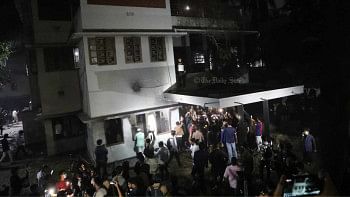We need activism more than ever

Recently, I watched a TV news clip of protesters in the United States demonstrating against the Health Care Bill that, if passed by the Senate, would deprive millions of basic medical benefits. What struck me most was the image of a young protester in a wheelchair struggling with the security guards trying to forcefully evict her. The image filled me with a sense of guilt and shame. I have always been acutely conscious of issues that adversely affect the less privileged. But in the last 46 years—since I actively participated in the Bangladesh Liberation War—I have not been in the front line to promote a worthy cause or a common good!
True, not all of us are destined to be game changers. But we can, and must commend the many unsung heroes who walk that extra mile to challenge social and political injustices. These agents of change are labelled as "activists" in common parlance—but let us take a closer look at who these people are and what kind of mindset they bring to social issues. One thing is obvious—they are not necessarily people who are directly affected by adversity. Many are individuals who feel a sense of moral imperative to step out of their comfort zones and join the struggle for the rights of the less fortunate. Whether it is marching for equal pay for women in the United States or rallying against the unsafe working conditions of garment employees in Bangladesh—activists leave their footprints by challenging the many injustices and inequities of our world. In the process, they raise public awareness and reshape our social and political consciousness.
One might ask: What is that special characteristic which makes some people confront danger and take grave risks to fight for a just cause? The most common trait among activists is their readiness to react and resist when they witness unfairness, inequity and exploitation of the disempowered. The catalyst for activism could be either personal experience or a shared social concern. For example, Gloria Steinem, while writing about the harsh conditions and unfair wages and treatment endured by women in a Playboy Club, discovered that the "Playboy Bunnies" were in fact used as sex objects. The revelation transformed her into a leading champion of women's rights. Martin Luther King Jr., on the other hand, directly encountered racial segregation and discrimination as a black American. He decided to "act" rather than accept the status quo. Mahatma Gandhi turned to protests and activism after facing abuse and persecution as a coloured person in apartheid South Africa.
Some artists, too, promote a cause by creating music, writing books or painting canvasses that contain strong social or political messages. In a recent interview published in The Washington Post Magazine, Harry Belafonte described this experience beautifully: "In the arts I found a platform where people were saying things that needed to be said, defiantly, poetically and with reward." The great advantage artists have is that even if they are censored by the establishment, they can connect to their audiences through social media or in a different location or country.
Just as activism needs leadership, it also requires mass support. We cannot underestimate the contribution of the numerous unknown people who join a struggle or a cause and turn it into a political or social movement. A case in point is the Language Movement that ultimately morphed into an independence struggle. The oppressive policies of the Pakistani regime and the subsequent brutalities of the army toward civilians impelled hundreds of thousands to join the struggle. This is also an example where the inspirational guidance of a leader, Bangabandhu, galvanised the population by making them aware of the need to preserve their freedom and dignity.
Unfortunately, not all activist movements yield success. But they do something else that is important: they allow the voices of the disempowered "other" to be heard. Whether it's through a protest march, or a Facebook call or a twitter cry, activists expose the unpalatable realities of the society or country we live in. They give voice to the voiceless and visibility to the invisible. People like the brave young woman in the wheelchair are the ones that make a difference to our world and inspire many to "act" rather than remain passive dissenters.
Activism has gained a critical status in today's fragmented and unfair world. Fortunately, internet connectivity has given a fillip to the power of social protests and is positively impacting public interest causes by providing a level playing field for disempowered groups. In a world where the richest 1 percent owns 50 percent of the total wealth and consequently enjoys enormous power, we, ordinary folks, no longer have the option to sit at home and do nothing. It's not about political or social vendetta, but about safeguarding the rights of the majority—the other 99 percent. To achieve this we need to rely on collective action. We must act as agents of change, because "change is brought about because ordinary people do extraordinary things."
Milia Ali is a renowned Rabindra Sangeet exponent and a former employee of the World Bank.


 For all latest news, follow The Daily Star's Google News channel.
For all latest news, follow The Daily Star's Google News channel. 



Comments